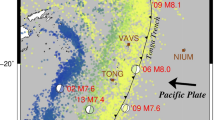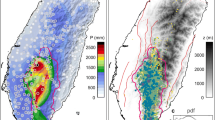Abstract
THE almost random occurrence of earthquakes seems to rule out any useful method of forecasting, at least until we understand and can closely monitor earth mantle processes. The probable influence of known natural factors like earth and ocean tides in triggering earthquakes is not sufficiently determining to be a forecasting aid. More hopeful are the results of ground deformation monitoring in the vicinity of such fault zones as the San Andreas, where patterns are emerging between ground deformation and ensuing local earthquakes1.
This is a preview of subscription content, access via your institution
Access options
Subscribe to this journal
Receive 51 print issues and online access
$199.00 per year
only $3.90 per issue
Buy this article
- Purchase on Springer Link
- Instant access to full article PDF
Prices may be subject to local taxes which are calculated during checkout
Similar content being viewed by others
References
Hofmann, R. B., Calif. Dept. Water Resources Bull., 116-6, 183 (1968).
US Coast and Geodetic Survey, preliminary determination of epicentres reports.
Author information
Authors and Affiliations
Rights and permissions
About this article
Cite this article
MOHR, P. Relationships between Recent Middle East and African Earthquakes. Nature 223, 816–818 (1969). https://doi.org/10.1038/223816a0
Received:
Issue Date:
DOI: https://doi.org/10.1038/223816a0
Comments
By submitting a comment you agree to abide by our Terms and Community Guidelines. If you find something abusive or that does not comply with our terms or guidelines please flag it as inappropriate.



